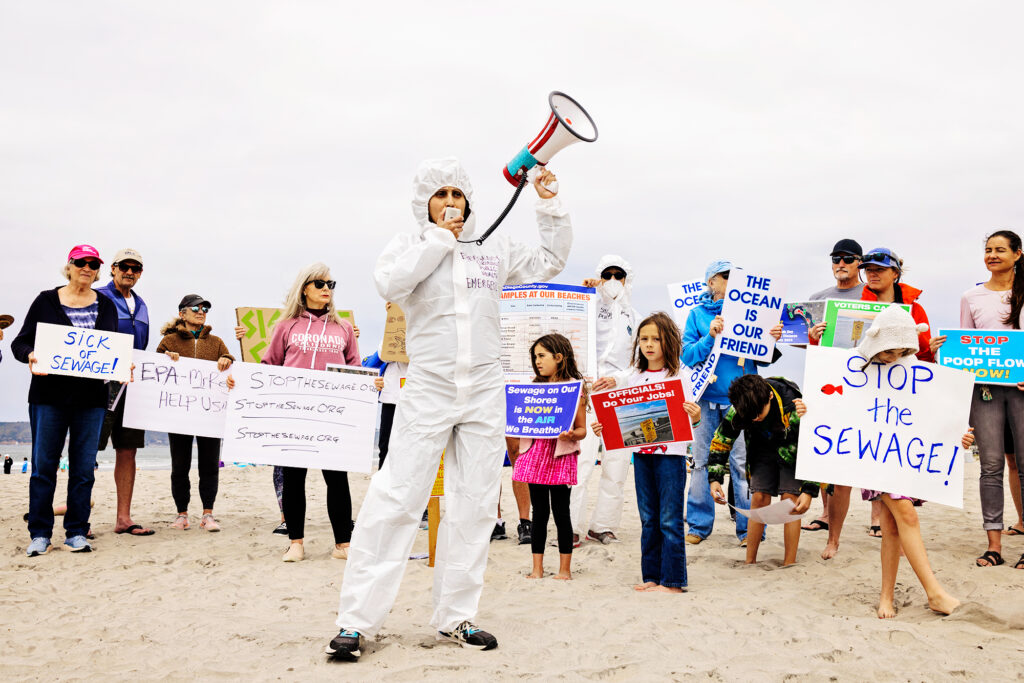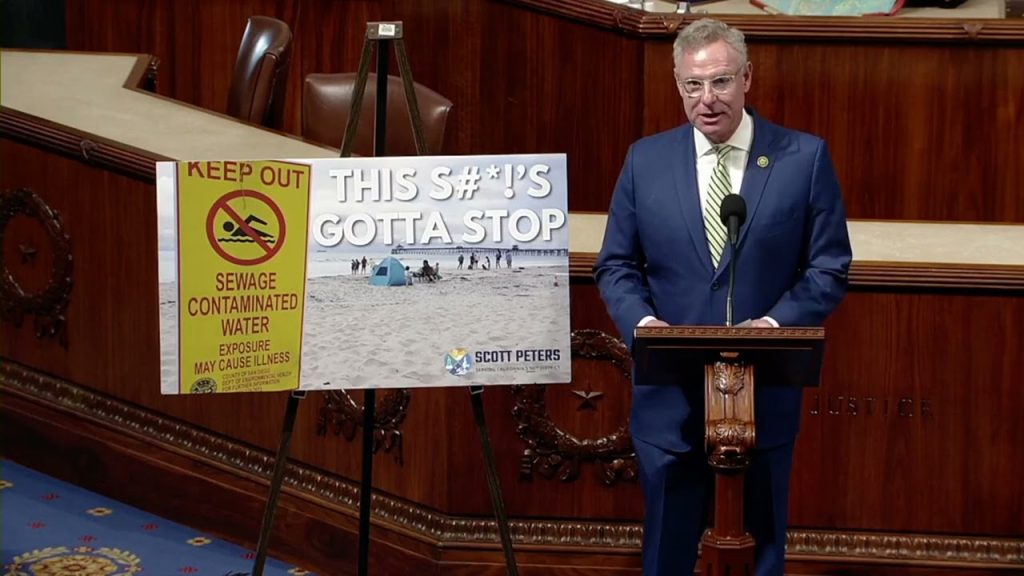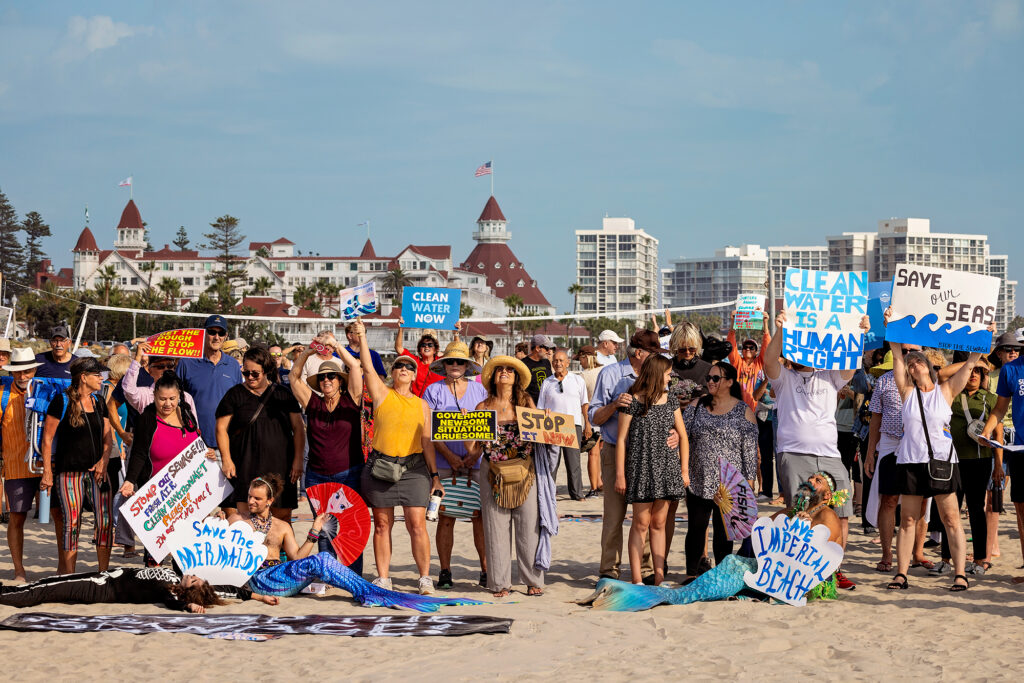
After a long fight, Congress is poised to approve a 2024 fiscal year budget that includes $156 million in funding to address the Tijuana sewage crisis.
“I’m so happy about it,” said City Councilmember John Duncan, who is part of the cadre of local politicians and citizens who have been pushing Congress for needed funding. “Every single bit of advocacy helped. We’ve reached the tipping point where everyone knows about it, everyone is talking about it, and it had to be funded.”
Congressional leaders on March 20 unveiled a $1.2 trillion funding package ahead of its Friday night deadline, after months of bipartisan negotiations and stopgap bills to prevent a government shutdown. The package comprises six appropriations bills, which are expected to pass in a vote on March 22.
“After years of steadfast advocacy from residents, servicemembers, and elected officials at every level, we’ve managed to get a real commitment from Washington to address this crisis,” said Rep. Scott Peters, who requested the additional funding, in a statement.

Tucked into the package is $156 million in funding for the International Boundary and Water Commission’s construction budget. The IBWC builds and maintains the crumbling infrastructure that contributes to the millions of gallons of sewage that flows into the Pacific Ocean daily, and it is $310 million short in funding to fix the problem.
This year’s IBWC funding level equals a $103 million increase, nearly triple, over the previous fiscal year.
While that leaves about another $154 million in needed funding, Peters and Duncan say it puts the agency on schedule for infrastructure repair. Duncan said he is optimistic that the IBWC will secure more money by the time it runs out of its current funds.
The IBWC is using previously allocated funding of approximately $300 million to begin the process of repairing the South Bay International Wastewater Treatment Plant, where the bulk of work is needed. That project is currently in the bidding process, and once a contract is awarded, the design/build process can begin.
That money won’t all be spent at once, Duncan said, so by adding another $156 million in funding, Congress granted an additional 12 to 18 months of runway. By then, Duncan said he is confident more money will have been allocated.
“(The funding) is not enough to finish it, they need more money, but it means that we’re on schedule now,” Duncan said. “There won’t be the delay that I thought was coming in a year and a half. We’re more than two years funded.”

Laura Wilkinson Sinton, a co-founder of Stop the Sewage, a local grassroots organization, said she will continue to pressure the government until all the money is secured.
“It’s a step in the right direction,” she said. “I want to thank everyone for all their advocacy. It really does take a village to raise our voices, and we have to be relentless in our continuing advocacy bc our beaches will continue to close until we fix this.”
But Wilkinson Sinton said there’s still work to be done. The Coronado High School Stop the Sewage Club will host a protest at 4 p.m. on March 28 at Coronado’s Central Beach.
“Until our beaches are open and safe, on an ongoing basis, we will be relentless in petitioning our government to fix this,” she said.
The funding package also includes language Rep. Peters submitted as an amendment to allow other federal agencies and non-federal entities, such as state and local governments and non-profit organizations, to transfer money to the IBWC. Before, approving such a transfer required Congressional approval.
The funding came after months of stalled Congressional negotiations and stopgap bills to prevent a government shutdown. Leaders on both sides of the aisle are citing victories, with Republicans applauding matters such as tighter border security and Democrats pointing to a $1 billion increase for early childhood education programs like Head Start as one of their wins.
Throughout the Congressional slog, Coronado politicians and citizens have been vocal advocates for securing funding to address the sewage crisis. Both Duncan and Wilkinson Sinton have traveled to Washington, D.C., to implore Congressional leaders to allocate funding. Coronado Mayor Richard Bailey has also joined such delegations.
Imperial Beach Mayor Paloma Aguirre and Chula Vista Mayor John McCann have also been vocal champions for the cause.
Now that the government has allocated so much money – first its $300 million allocation, and now this $156 million one – Duncan said he is more confident than ever that more money is coming.
“As the government invests money, the realization is you have to invest the rest to finish or else you’ve wasted your money,” he said. “You can’t just half-build this, and the initial $310 million would have been a waste without this extra funding.”
The IBWC will hold a citizens’ forum to discuss this new funding and construction plans at 5:30 p.m. on March 28 at the Coronado Community Center.





